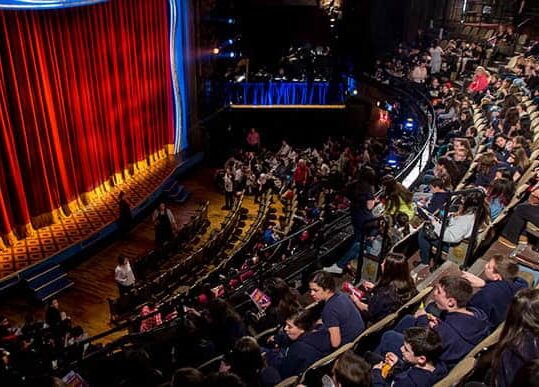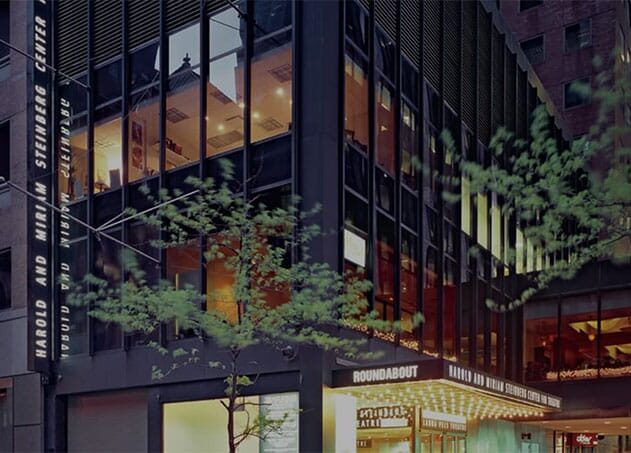Building a Better Roundabout
On Our Stages
Targets & Progress
In September 2021, we shared our plan to build a better Roundabout. Explore our yearly progress and review our original five-year goals below.
50%
50% of our productions across all stages to be BIPOC stories
We’re defining a BIPOC story as one: written by a BIPOC author or a majority-BIPOC team; containing a significant plot line centering BIPOC character(s); and/or reinterpreted through a BIPOC perspective.
50%
50% of our Broadway productions to be BIPOC stories
Our Five-Year Goals
Diversity
To widen our pools of artists, we will:
Program more time in our production schedules for our hiring decision- makers to explore new artists and collaborators
Make the financial commitment to be able to hire more non-local performers and designers
Create reciprocal networking initiatives for our hiring and programming decision makers and artists
To support this diverse array of artists, we will:
Collaborate with them about each production’s need for intimacy, cultural, and other necessary consultants to promote equitable and safe spaces
Ensure we have culturally representative costume, hair, and makeup backstage personnel, and work with the unions to continue to diversify their membership
Learning
Develop consistent, mandatory anti-racism training for all participants in the production/rehearsal process in order to ensure equitable and safe spaces
Challenge our implicit bias in programming, casting, and hiring decisions
Accountability
Before committing to production, require all collaborators including authors and authors’ estates to be aligned with our EDI/AR principles
Maintain mechanisms for timely reporting, resolving, and repairing EDI/AR incidents and develop post-production surveys to assess their efficacy
Make wage scales and employment terms applicable to our venues readily available
Create a task force to explore options to reconcile pay-equity between Broadway and Off-Broadway spaces
At top of each season, consult with directors and creative teams to review rehearsal and tech schedules to take into account all factors for each production, and work out a schedule that meets the needs of the production without overly taxing the artists and other workers
2021-22 Season
Action Points
Expanded early hiring plans to encompass intimacy and cultural consultants as needed for each production
Theatrical Workforce Development Program, in partnership with IATSE, has increased diverse representation backstage and in the technical-theatre pipeline
To reconcile pay-equity between Broadway and Off-Broadway, we have created a task force that holds regular meetings and has begun costing-out potential scenarios starting with comparisons between our two venues at the Harold & Miriam Steinberg Center for Theatre
Expanded the search for wardrobe, hair and makeup personnel to find qualified new-to-us workers and who share identities with our casts
Engaged people of color in hair/makeup supervisor positions who had not yet worked in that leadership capacity
Held 90-minute anti-racism training sessions held with every company
Collaborated with directors to build schedules that do not include “10 out of 12s”
Held our first affinity group Space Jam writers’-support initiative for our BIPOC artists
2022-23 Season
Action Points
Expanded early hiring plans to encompass intimacy and cultural consultants as needed for each production
Hosted networking events to expand our artists’ pipeline of designers, writers, and stage managers, and hired several new-to-us designers
Began work on an Institutional Principles document to share with creative team members, including directors, that addresses diversity in casting and hiring on our shows
Continued to hold 90-minute anti-racism training sessions with every company
Continued to collaborate with directors to build schedules that do not include “10 out of 12s”
Developed system for reporting EDI/AR issues and hired mediators to lead restorative practice when necessary
Made distinct gender-inclusive, accessible restroom signage across all our theatres
2023-24 Season
Action Points
Produced the first Broadway revival of Samm-Art Williams’s 1979 Home in spring 2024, the first production to emerge from The Refocus Project
Continued dialogue with our union partners about prioritizing and aligning our collective EDI work
After 3 seasons of readings, we examined the impact and effectiveness of The Refocus Project, our program to transform the canon, and plan for its future



